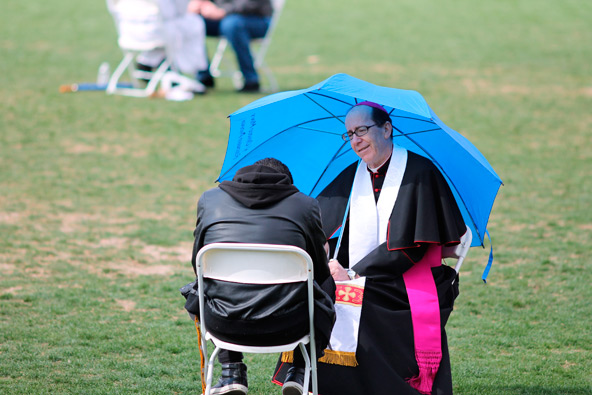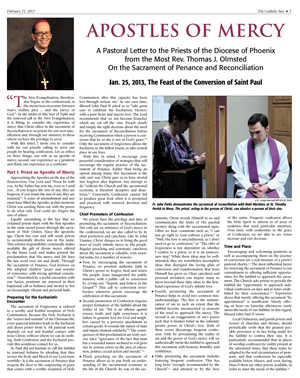
The most underused sacrament of our Catholic faith is arguably the one people need to receive more frequently — reconciliation.
Reconciliation, also known as penance or confession, is one of the seven sacraments of the Catholic Church. Through this healing sacrament, the penitent experiences God’s love, mercy and forgiveness.

“Apostles of Mercy.”
catholicsun.org/tag/pastoral-letter
“I realize the sacrament of reconciliation is not for God’s benefit, but for my benefit. I need it,” said Chris Zajdzinski, founder of Tempe-based Virtuous Life Ministries. “There’s a real human need to be authentic, and a need to confess that to another person. We want to hear the words of Christ, not our neighbor.”
Catholics confess their sins to a priest because God, in the person of Jesus, authorized the priests of the Church to hear confessions and empowered them to forgive sins in His name.
“Jesus said to them again, ‘Peace be with you. As the Father has sent Me, so I send you.’ When He had said this, He breathed on them and said to them, ‘Receive the Holy Spirit, if you forgive the sins of any, they are forgiven them; if you retain the sins of any, they are retained’” (John 20: 21-23).
When Catholics confess their sins to a priest they are, in reality, confessing to God because it is God who hears their confessions and it is God who does the forgiving.
“Confession is examining our conscience, and humbly bringing our sins to the Lord,” said Fr. Charles Goraieb, pastor of St. Timothy Parish in Mesa. “Pope Benedict said the New Evangelization goes through the confessional. It’s where people get restored and encounter God; we have our spirits refreshed.”
To understand the need for the sacrament of reconciliation, it’s important to understand the definition of sin; sin is something we say, do, or desire that is against God’s law.
The Catechism of the Catholic Church states, “Sin is an offense against reason, truth, and right conscience; it is failure in genuine love for God and neighbor caused by a perverse attachment to certain goods. It wounds the nature of man and injures human solidarity. It has been defined as ‘an utterance, a deed, or a desire contrary to the eternal law’” (§1849).
Fr. Goraieb said sin not only ruptures our personal relationship with God, but with the Mystical Body of Christ.
“The nature of sin isolates us from God,” he said, “it is so profound and wounding that it causes us guilt and remorse. Our emotions are so great we can’t hear God forgiving us on our own because of the intensity of the emotions.”
Satan, also known in the Book of Revelations as “the accuser,” is quick to remind sinners of their guilt and remorse.
“Satan plays on those two emotions,” Fr. Goraieb said. “We need someone to tell us we are absolved of our guilt, and it can’t be done by a friend or well-intentioned counselor. It can only be done by someone with authority, and Jesus Himself set it up so that a priest is authorized by the Church, and can do that for us.”
It is through the sacrament of reconciliation that sins committed after baptism are washed away by the blood of Christ, and the sinner is forgiven and reconciled with God.
Fr. William Schmid, parochial administrator of St. Mary Magdalene Parish in Gilbert, said the faithful need to understand the sacrament is a gift God gave to everyone.
“The sacrament of confession is beautiful, but a lot of people misunderstand it,” he said. “It is not about condemning somebody, or embarrassing them or making people ashamed. The sacrament is there to heal the damage caused by sin in someone’s life.”
All too often society tells us we can experience life on our own terms, and pull ourselves up by our bootstraps. When we confess, it’s an admission that we’re not perfect, don’t know everything or control everything.
“The sacrament of confession says you can’t do it alone, that you need healing and forgiveness,” Fr. Schmid said. “People are so afraid to face their vulnerability that they can’t do it by themselves.”
Typically, there are six parts to the sacrament of reconciliation: examination of conscience, reflecting on the Ten Commandments and the Sermon on the Mount; act of contrition, a prayer asking God’s forgiveness; welcome, a greeting and/or prayer by the priest; confession, or disclosure of sin; absolution, the words of forgiveness; and penance, an expression of prayer or action to show sorrow for our sins.
The Catechism of the Catholic Church says that we pray an act of contrition because our souls are filled with sorrow, and we detest our sins. We also promise to try not to sin again (§1451).
The Precepts of the Catholic Church state that Catholics need to confess their sins once a year. Mortal sins must be forgiven through the sacrament of reconciliation, and it must be done prior to receiving the Eucharist.
However, we are encouraged to receive the sacrament regularly.
“Even venial sins can harden our hearts,” Fr. Goraieb said. “The sacrament connects us and restores us to God.”
“Our Faith” is a special Year of Faith feature that seeks to clarify often misunderstood Catholic teachings.





